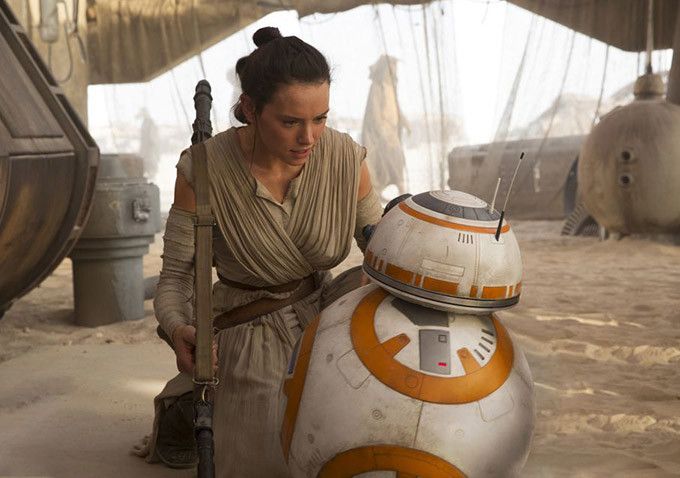Star Wars Math
Since Lucas sold the franchise, we're getting a new Star Wars film every year. But they're still pretty special. And today The Last Jedi officially opens.
I'll be there this weekend, assuming it's not sold out. (Actually, big films open so wide you can always get a ticket somewhere--wasn't that way a few decades ago.)
A new SW film leads to the question, how to deal with the first two trilogies. And here's a good piece from a couple years ago, when The Force Awakens opened, that discussed the proper order in which to watch them.
The most popular seems to be the order in which they were released--4, 5, 6, 1, 2, 3. But there's a sizable group--including George Lucas, of course--who insist on 1, 2, 3, 4, 5, 6. (As Sheldon Cooper put it, "I prefer to let George Lucas disappoint me in the order he intended.")
Then there are variations, including starting with 4 and 5, then switching to 1, 2 and 3 to see the background, before ending with 6. Some, of course, say 4, 5, 6 and forget the rest.
There are two problems. The first is quality. The original trilogy is so superior to the prequel trilogy that you probably don't want to start with those weaker six hours. But then, if you've got to get to them eventually, why wait?
The bigger problem is the dramatic shape. Sure, chronologically in that galaxy far, far away, things happened from 1 to 6. But dramatically, there are all sorts of surprises, especially in 4 and 5, that will be ruined if you watch the prequels first. And 4 and 5 were designed to be watched with no preparation. So not only are 1 through 3 weaker films, they weaken 4 through 6.
Since the article was published, we got 7, which should come last, I suppose. But, actually, since it's as if the events in 6 never happened, maybe it could be shoved somewhere between 5 and 6. We've also got Rogue One, which explains--in a well done but unnecessary way--how we got to the events of 4. I still suggest 4 and 5 must go first, since you simply don't want to take anything away from them.



10 Comments:
I saw Last Jedi tonight. It was chock full of spoilers.
My choice would be 4, then 5, then 6 with Ewoks removed. Full stop.
But if that's not allowed, the Machete Order is probably the best choice.
Why do you say that 7 is "as if the events in 6 never happened"? In 6, Han was rescued, Darth Vader died, the emperor died, Luke decided his destiny was to become a jedi, and Han and Leia got together. All of those developments are clearly necessary for 7 to occur. The only contradiction I might see is that the jubilant ending of 6 could be interpreted as "All evil is vanquished forever".
No spoilers for 8, please! Not that I care much. After standing in line for two days for Episode One (23 hours for the tickets, then a week later 25 hours to get in -- although there were a bunch of us taking turns, so I was only actually in line for maybe 30% of this time), my friend Walt and I vowed to hate Star Wars forever, not only Episode One but retroactively all of it, on the grounds that George Lucas had ruined it all. I still mostly feel that way, although I've seen all the movies since then, unenthusiastically. Episode 7 was enjoyable if you pretended you'd never seen 4. Bottom line -- this is still me.
In 6 the empire is defeated and the rebels are victorious. Next comes 7, where the empire is still in charge, no matter what they call it, and the rebels fight desperately to avoid being destroyed.
Also, there's a new emperor and a new Darth Vader type. They've got this new super-weapon that blows up planets and the rebels need to destroy it.
The protagonist is this orphan kid from a nowhere planet with no experience but great skills who gets a cute droid as a companion and gets to fly around in the Millennium Falcon with Han Solo and Chewie. They go to wild places including this weird spot with all sorts of alien types in it. The kid also has origin questions and needs to learn about the Force.
I was much more put off by episode 7 than the prequels, though episode 3 was nearly bad enough for me to swear off the whole franchise. I'm really not excited about seeing 8, but I skipped Rogue One and you seem to say it was well done, so I might look for them on TV.
Would you agree that the problem with the prequels, and so far the sequels, is Lucas has lost the ability to tell a coherent story? I actually thought Episode 1 did the best in this department, perhaps because Lucas didn't try to fill in every facet of his universe (like where did the Sith come from). The crime in the prequels has been that he made the Jedi a bunch of fools (including Yoda). But standing alone, I find Phantom Menace watchable. So I would watch 1, 4, 5, 6, because 1 gives you an inkling of how the empire came to be, that Anikin was special and that the Jedi were doomed. It also doesn't spoil the reveal in 5, which remains effective for young people who don't know.
There are a lot of problems with the prequels. First, maybe foremost, is we didn't need them. Once you've established a story (indeed, a galaxy) that people like, I'm generally not a fan of going back to show how it got there. Let it be vague, no one's troubled. We all have our tantalizing ideas of what it may have been like, and Lucas's vision, even if he's the creator, will likely not live up to what others expect. (And don't forget he created the original Star Wars to be organic and complete on its own. Even Empire Strikes Back shows the strain of retrofitting.)
It's especially bad if you're going to make three full-length movies to show how things got to the place where the original started, while we were perfectly satisfied with none. It would have been better if Lucas decided to say no to prequels and go straight to the sequels--even if he believed he had already said what he had to say with the original trilogy.
That said, as poor as the prequels are, I'll give Lucas credit for trying something different. The sequels are giving the fans what they want, but the trick (and it's a difficult one) is to give them something they didn't know they wanted.
As far as Lucas's ability to tell a coherent story, the problem there is a bit different. Lucas was able to come up with a coherent plot for the prequels, one that might have even worked. He just wasn't able to invest his story, or his characters, with any life. He got magic the first time he tried, but there are no guarantees it works every time.
As far as the sequels, Lucas has no part in them. He sold his property and his suggestions for new plots have been ignored. I'd love to hear what they are.
I agree with LAG's last comment: episodes one, two, three didn't lack plot. They lacked interesting characters and believable emotion. They had plenty of plot, but I didn't care enough to pay attention to it.
7 was a direct copy of 4, a fact that has been noticed by almost everyone I know who saw the movie. The only significant change is that in the 20th century, action heroes were white males, and now they're not.
Ross Douthat summed it up well: Lucas had admirable ambition for the prequels. His goal was to explain how a galactic democracy became a dictatorship, how the ancient Jedi protectors of civilization were destroyed, and how a young Jedi with many friends and admirers turned into an evil villain. He failed to make any of these things believable, but at least he tried.
By contrast, in episode 7, Abrams set himself a very modest goal: re-make a 1977 movie. He succeeded.
Douthat argues that Lucas' ambitious failure is more admirable than Abrams' cautious success.
I suppose it could well be more admirable and less interesting.
My complaints about the prequels relate to plot elements like why a society would have elections for Queen. And if they do have elected Queens, how does a 17 year old get the job?
Why do the Jedi ignore the difficulties Anikin is having with dreams and premonitions? We were told Anakin was the one Jedi who betrayed the Jedi, but then we learn about Count Duku, who Obi-Wan never mentioned as having some part in this all. What was the point in not telling the last two likely Jedi who they were? Why was the rebellion operating completely separate from the remaining Jedi?
And what did Quigon tell Yoda about life after death? Did that knowledge have anything to do with why Yoda and Obi-Won became hermits, leaving the rebellion to flounder? Maybe QuiGon told them don't worry about it, everything balances out in the end.
And ultimately, who was the Chosen One who brought balance to the Force - was it Anikin or Luke?
I could answer all your questions, of course, but why not just Google them.
As for who is the Chosen One, I think Lucas's answer, ultimately, is Anakin. He brought balance to the Force, and a happy ending, buy choosing to attack the Emperor. In other words, balance to the Force means the evil side is destroyed so the good side can rule.
My recommended order for viewing is to watch Star Wars- the original self-contained movie (I do not deign to call by its later diminished title or as an "episode"). The rest is just filler and cashing in, some better than the rest. I like Empire next (but it was an episode not a contained movie so boo) and the Revenge and Return. Clones had some interesting stuff and Phantom Menace was too plotty about stuff no one cares about and shown have been a bonus feature on a DVD set for those that needed the background.
The new trilogy I would enjoy as a guilty pleasure akin to Return to Gilligan's Island (or maybe just as brand new movies). I liked Force Awakens but don't recall much specifically. My son was so-so about The Last Jedi (he would have preferred one big plot to three choppy plots but I guess I will find out for myself later during vacation). We visited Skellig Michael this summer where some scenes were filmed so I have that to look forward to as well.
Post a Comment
<< Home